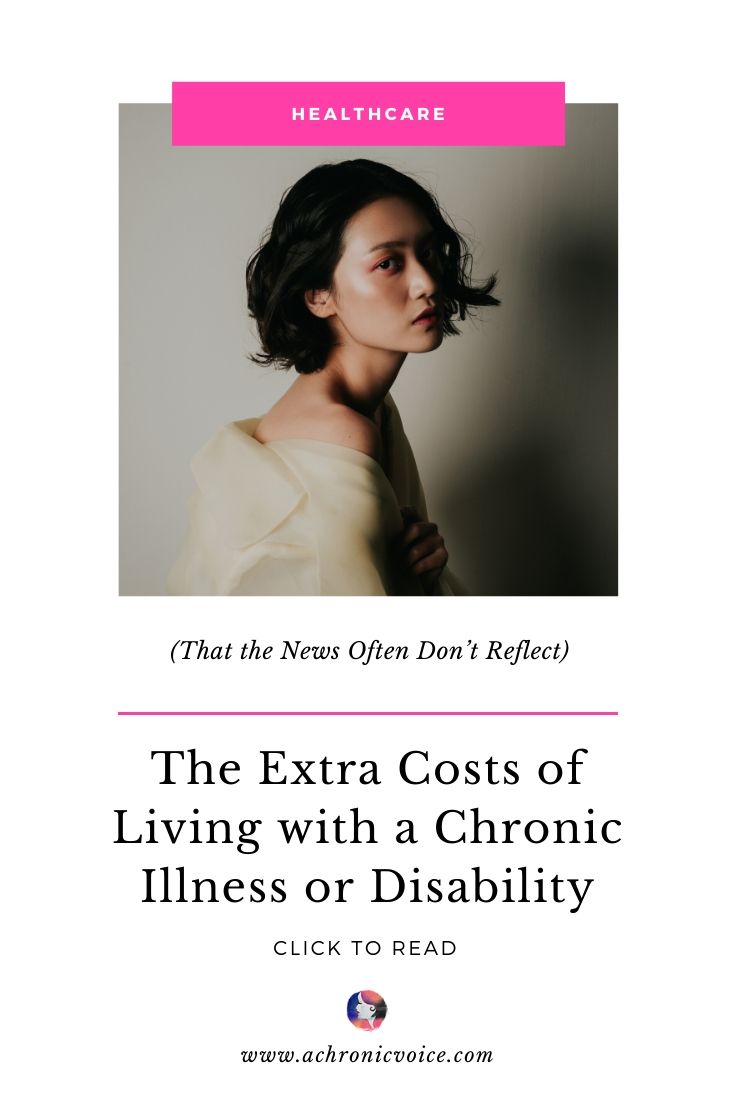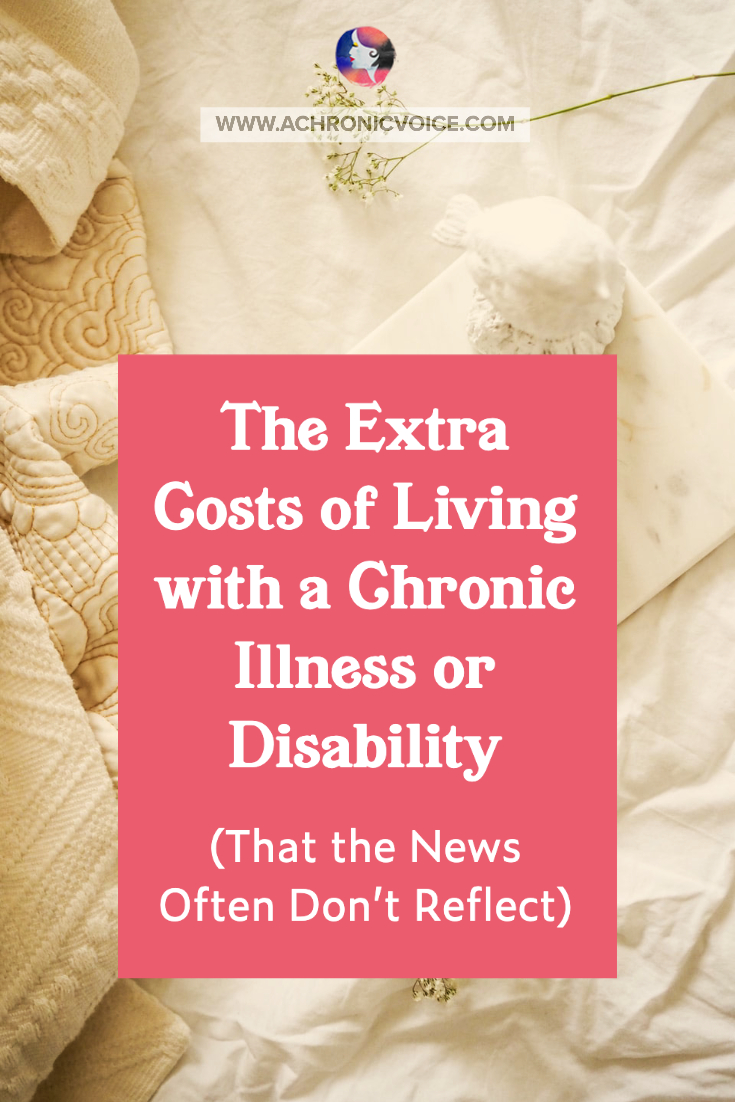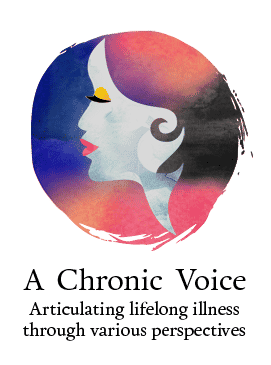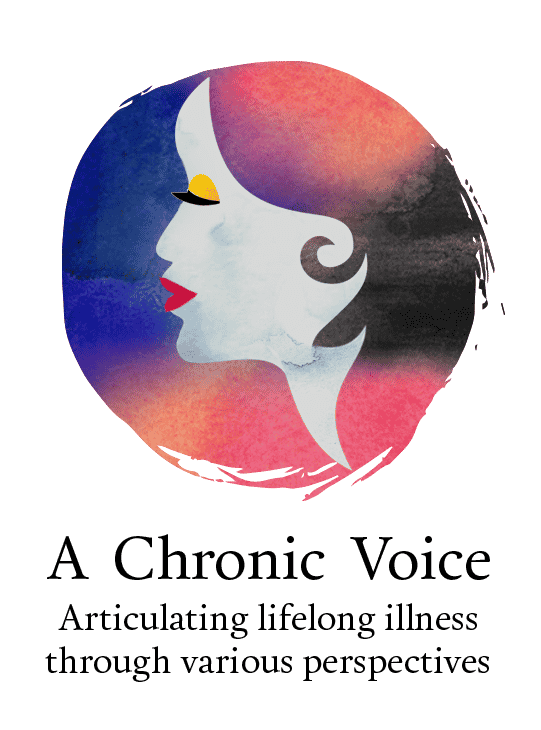We all know the truth of the saying, ‘health is wealth’. But apart from the metaphorical aspect of this idiom, it’s actually pretty literal as well. It’s expensive just to stay alive if you have a chronic illness or disability, especially if you live in a country where healthcare is not subsidised. There are extra costs that come with such circumstances, that are often not reflected in statistics or the news.
Medications, doctor appointments and the endless medical investigations add up quickly, and there is never a ‘final solution’ to your problems. A lot of trial and error is involved, and usually patients can only achieve a quality of life that’s manageable, rather than good or even above average.
Chronic illness patients often need to add a range of holistic, professional and/or alternative therapies and services to their pain management plan. This may include anything from massages and yoga classes, to caretakers and unique pain relief tools. Sometimes patients need to pay to see a private doctor as well as they are in too much pain, and cannot afford to wait months before seeing one on public healthcare.
Here are a few things that chronic illness and disability patients need or which helps to improve their quality of life, that are often not taken into consideration when one mentions ‘the cost of healthcare’.
Table of Contents
Occupational Therapy, Yoga & Other Physical Therapy Sessions
Many chronic illnesses have a physical impact on our bodies. Movement can cause pain, and in some illnesses such as EDS (Ehlers Danlos Syndrome), it can even lead to joint dislocation. People with dysautonomia have trouble sitting and standing, and some with ME/CFS are too fatigued to even get out of bed. These are just a few chronic illnesses that disable us from walking around our own homes, much less do some exercise.
Those with debilitating chronic pain sometimes need help from a physical or occupational therapist. These professionals are trained to guide their clients through gentle exercises that are safe for their bodies. It is important to maintain muscle strength and move without injuring yourself, otherwise you may end up trapped in a pain cycle. These sessions aren’t always cheap, and the cost can add up quickly especially if you need more sessions per week.
Yoga, tai chi, and other forms of gentle exercises can also be useful for people with chronic illness. These movements and poses need to be done properly however, or they might end up harming more than helping your body. Beginners and even intermediate students often need an instructor for guidance for this reason. These classes are beneficial in many ways for those who live with chronic pain, but once again, add to healthcare expenses.
I tried flotation therapy for a while, and found that it helped me a lot with painsomnia. It is also beneficial in the healing process of your body. I stopped due to the cost of each float session. Other types of therapies include cryotherapy (which I’ve never tried due to the cost), and infrared saunas.
The Need for Organic or ‘Clean’ Products and Food
This is often not even a want, but a need. Many shampoos and soaps with harsh chemicals have an immediate effect on my body. They cause rashes, itchiness, dryness, and even adds to the pain. Scented products can also trigger migraines. Many of our bodies have become hypersensitive as a result from both our diseases, and also the medications we have no choice but to take.
Many with chronic illnesses need to be on a special diet that are specific to their condition. For example, I need to monitor my intake of Vitamin K and blood thinning foods due to Antiphospholipid Syndrome. Celiacs do not consume gluten-free food simply as a fad, but as a matter of survival. Those with IBS (Irritable Bowel Syndrome) and food allergies also need to be careful with ingredients that are often hidden.
Organic or foods that are better in quality are generally more expensive. This is one reason that people often choose the cheaper versions whilst doing their grocery shopping. Yet for many of us with chronic illness, the chemicals and pesticides in such foods can trigger yet more pain and damage to our bodies. We often have no choice but to spend a bigger portion of our finances on produce of higher quality.
Hiring a Caretaker or Cleaner
Those with physical disabilities, the elderly, or a chronic illness that limits their mobility might require assistance from a caretaker. Our family members can’t always be there to help us through the day. Simple activities such as preparing meals or going to the bathroom can be impossible for some to accomplish on their own.
We also have trouble cleaning the house, either from chronic fatigue or pain. I know that my hands become swollen from washing the dishes, or mopping the floor. Whilst this is still tolerable for me, those with larger families or more crippling pain might end up neglecting the upkeep of their homes, and not by choice. This is not only depressing, but a clean house is essential for our wellbeing in many ways, especially when you spend so much time in it.
Adapting our Homes for Accessibility
Many with chronic illness or disabilities need to adapt their houses to make things more accessible. This can be a simple change, such as re-arranging where we place things to make retrieval easier. But often we need to invest in certain areas that may not come cheap. This may include modifying your shower area to include grab rails, and doors that are safe. A high quality mattress and pillows are important as well, so that one does not wake with more pain in the morning.
Stairlifts are useful especially if you live in a multi-storied house. They make it much easier for the disabled and elderly to move around and regain some independence. There is a wide range of stairlifts to choose based on space and budget constraints, and might be something worth enquiring further about.
Wheelchairs & Mobility Aids
Some people with chronic pain may be able to walk a little, but still need a wheelchair or mobility aid to travel longer distances. For others their wheelchair is literally their legs. Whilst insurance may provide a wheelchair, they are usually ones that are lower in quality. Many find them uncomfortable, and sitting in them all day can cause more aches and pain.
If you are struggling with the question of whether you should use a wheelchair or not despite being able to walk, I want to encourage you to do so. Whilst I do not have much experience about this myself, every single blog that I’ve read has had no regrets doing so. Some have even invested in or ran fundraisers for a powerchair or wheelchair, in order to improve their quality of life. Such tools can burn a hole in your pocket, yet the quality can be worth it.
Pain Relief Toolkits
Everyone with a chronic illness has their own special pain relief toolkit. We all use different things to relieve pain, as not everything works the same for us all. Some use essential oils to ease their anxiety or migraines, whilst others use digital tools such as the Quell or OskaPulse to generate pain relief.
CBD oil is on the rise and can be used in a few different ways – as a tincture, ointment, vape, gummies and more. Then there are the moisturising eyedrops and mouthwash needed for Sjögren’s Syndrome. Heating blankets or ice caps can help to ease many kinds of pain, and I find that anti-inflammatory plasters help to ease arthritic types of pain. Migraine glasses help to block out certain lights so that migraineurs can actually leave their homes. These are just a few products that help to improve our quality of life.
Mental Help & Art Therapy
Many who struggle with pain on a daily basis end up with mental health issues, which comes as no surprise. We often need to seek the help of a psychologist, which isn’t always covered by insurance. Professional help like this can be costly, although online therapy is making this more accessible.
Art therapy is also a useful avenue to help a person regain a grip on their lives, but as with anything, can add to costs. There are other ways that we can work around this, such as a hobby or colouring books, but even these often need some money to be spent!
In Conclusion
As you can see, living with a chronic illness or disability isn’t only about seeing the doctor and getting prescribed medications. Many of the statistics that are reflected in the news do not delve into the everyday, which is where we actually live our lives. If you live with chronic pain like me you would understand that any relief, however slight, is often worth a shot.
Note: This list is just a rough guide, and nothing in this review should be taken as medical advice. Always be sure to check with your doctor before you start on any new treatment or protocol. Whilst this post is sponsored by Handicare Stairlifts, all opinions expressed within it are my own.
Read More: Chronic Illness is Expensive, but Here’s the Real Reason Why
If you liked this article, sign up for our mailing list here so you don’t miss out on our latest posts! You will also receive an e-book full of uplifting messages, quotes and illustrations, as a token of appreciation!
Pin & Help to Share the Post!





Hi Sheryl,
As always, very well written, very informative post!
I’m sooo lucky to live in London, UK, where our health care is “free” (taxes say otherwise), so my wife has access to the NHS anytime anywhere, however…
What I’d like to mention is also that apart from chronically ill people losing time off work during their flare-ups, aome of their partners lose on it too.
My wife has endometriosis, fibromyalgia, and is often chronically fatigued. Sometimes she even struggle to work from home when feeling anxious and depressed, often suicidal.
In times like this I take time off work to help her go through these difficult moments as I’m afraid of her wellbeing. I take time off work, which affects both of our incomes.
Chronic conditions bring a big financial strain on people who suffer from them, and the closest ones too.
Thank you Sheryl for that post!
Thank you for taking the time to read and comment, Lucjan! Yes definitely, the toll and changes in lifestyle for caregivers are equally as drastic, and should be spoken of more often. More provisions should also be given to them.
Finances are definitely a heavy weight with chronic illness, especially for those who are all alone. We often worry about what the future entails.
Thank you for stopping by, and I love what you do so keep at it! Take care and say hello to your lovely wife, too!
I totally agree with this. Having a chronic illness and/or disability is a money pit. It’s hard to rationalize all the extra expenses for therapies. It’s like you know that they are helping you, but when you can’t see the direct benefit instantly, it’s hard to keep justifying the costs.
Totally. And the problem is sometimes it takes quite a while of rigorous therapy before you start to see results, just like medications. But it’s too costly to ‘test’ these on our own 🙁
I’m late to comment as I have only now read the article. I live in Canada which has public healthcare, but contrary to popular belief, I have to pay for everything on that list. I have extended health insurance that I pay a premium for and last year they put a limit on how much you could claim in a year. It’s getting so bad that my meds are no longer reimbursed at all (I used to get 80% back) and alternate therapies like physical therapy, massage, acupuncture, etc. have a combined limit of $1000 per year. I’ve had to pick and choose as using one therapy only allows me eight visits max. In 2019 I had 3 long distance ambulance rides costing $5000 and only $10000 was reimbursed.
Medical equipment is no longer covered at all, so to replace my wheelchair will cost $20000, which I do not have so I sit in my 20 year old wheelchair that’s too small.
The costs of living with a disability and chronic illnesses is astronomical.
Just want to point out that IBD and IBS are vastly different. Was it a typo saying they’re the same?
Hi I do know that they are different. I don’t think there was any mention of IBS in this article?
I just found this blog through Pinterest. It’s very well-done and so nice. to find others who understand!
I also noticed the IBS/IBD mix-up (little pet peeve of mine as someone with IBD). It’s in the section on “The Need for Organic or ‘Clean’ Products and Food”. Definitely feel the cost on my medical food since I have a malabsorption issue with most food!
Looking forward to checking out more of your work!
*Natalie
Hi Natalie, that is nice that you landed via Pinterest! Do you have a blog yourself that I could check out, too? 🙂 I didn’t know the distinction so clearly either but being involved in the online chronic illness community has taught me heaps 🙂 Will update once I can, if there’s any errors on my end. Sending good thoughts!
I tried keeping track of my “extra” costs due to health. Wow, it got too overwhelming! It’s so frustrating that pain management (other than a few) is not covered by health insurance, even if doctor recommended. I had 4 PT visits recently (before the quarantine). I just got a bill for over $500! I’m supposed to have that at least covered by my insurance (my copay should be $30 per visit and I already paid for one). I’ve got a message into them about this. I’m hoping they’ve made some sort of clerical error!
Hi Katie, yes it’s so sad isn’t it? I’m sorry to hear about the bills! 🙁 I think society just assumes treating illness consists of doctor fees and medications. Those are expensive enough, but there are soooo many other things that come into play when dealing with and trying to manage pain, and every individual’s needs and reactions are different. Tricky thing.
I have always found your posts helpful Sheryl, and this is another one those special ones.
“It’s expensive just to stay alive if you have a chronic illness or disability” – and it’s so easy for this financial expense to bog us down mentally and send the mind into a tizzzzzzy!!! I think finances can be one of the most distressing non-medical factors which are obviously made worse by the health issues – something most who are healthy don’t realise. You put it all into perspective so nicely.
Thanks so much for your encouragement, Shruti 🙂 Yes it’s extra expensive just to breathe with chronic illness hey! I also agree that finances can be one of the most distressing factors when you live with health issues, and get somewhat annoyed with all the ‘money isn’t everything’ or ‘you don’t need money for a good life’ rubbish quotes out there ahahhaa.
Health care is so expensive, and all the adaptations you mention too. From train fares to medical appointments to supplements, to more expensive coffee because I have to have decaf (I know that’s a silly one, but still, it’s an extra cost) being chronically unwell is an expensive life for sure!
Please don’t call it silly, it isn’t silly one bit! What’s life without the little pleasures? Seriously 🙂 And yes, I think people and sometimes even ourselves as patients have no idea that chronic illness living can cost so much. Sometimes I wonder what I spend on and when I count it all, it’s when I realise.
So many costs and only so much $ available. The hard part for me is deciding what treatments are worthy of putting my few eggs into.
Yes crazy costs for everything unfortunately 🙁 Yes and the problem is sometimes you don’t know til you try, and sometimes it works, other times money down the drain 🙁
I’m recording the amount I’m spending out of pocket. I do this for our LLC expenses and income, but I decided to keep track of this too, just to really see what I’m spending.
Sounds like a good idea. I do keep track of it in a rough sense and it can really add up quick!